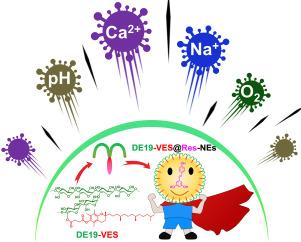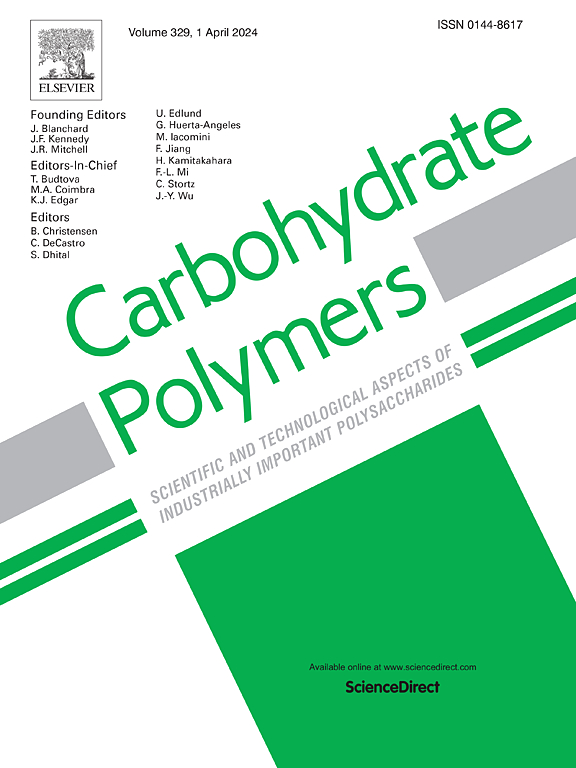Replacing OSA starch: A novel maltodextrin-vitamin E succinate conjugate with superior emulsifying and antioxidant performance in resveratrol-loaded nanoemulsions
IF 12.5
1区 化学
Q1 CHEMISTRY, APPLIED
引用次数: 0
Abstract
This study developed novel maltodextrin-vitamin E succinate (DE19-VES) conjugates were synthesized at different mass ratios of VES to maltodextrin (5 % and 10 %) as multifunctional emulsifiers for resveratrol encapsulation. Compared to nanoemulsions stabilized by octenyl succinic anhydride-modified starch (OSA![]() S), those stabilized by DE19-VES conjugates exhibited significantly smaller droplet sizes, higher encapsulation efficiencies, and superior physical stability. Crucially, the DE19-VES conjugates imparted exceptional antioxidant properties to the nanoemulsions, enhancing radical scavenging activity, oxidative stability, and markedly improved protection of encapsulated resveratrol against degradation. In vitro digestion demonstrated significantly enhanced resveratrol bioavailability from DE19-VES-stabilized nanoemulsions versus OSA
S), those stabilized by DE19-VES conjugates exhibited significantly smaller droplet sizes, higher encapsulation efficiencies, and superior physical stability. Crucially, the DE19-VES conjugates imparted exceptional antioxidant properties to the nanoemulsions, enhancing radical scavenging activity, oxidative stability, and markedly improved protection of encapsulated resveratrol against degradation. In vitro digestion demonstrated significantly enhanced resveratrol bioavailability from DE19-VES-stabilized nanoemulsions versus OSA![]() S. Cytotoxicity evaluation using human gastric mucosal epithelial cells (GES-1) confirmed that all formulations were non-toxic. These results highlight the dual functionality (emulsification and potent antioxidant activity) of the engineered maltodextrin conjugates, establishing their strong potential as advanced carbohydrate-based emulsifiers for protecting and delivering sensitive bioactives in pharmaceuticals, functional foods, and supplements.
S. Cytotoxicity evaluation using human gastric mucosal epithelial cells (GES-1) confirmed that all formulations were non-toxic. These results highlight the dual functionality (emulsification and potent antioxidant activity) of the engineered maltodextrin conjugates, establishing their strong potential as advanced carbohydrate-based emulsifiers for protecting and delivering sensitive bioactives in pharmaceuticals, functional foods, and supplements.

替代OSA淀粉:一种新型麦芽糖糊精-维生素E琥珀酸盐缀合物,在白藜芦醇负载纳米乳液中具有优异的乳化和抗氧化性能
研究了一种新型的麦芽糖糊精-琥珀酸维生素E (DE19-VES)缀合物,以VES与麦芽糖糊精的质量比(5%和10%)作为白藜芦醇包封的多功能乳化剂。与辛烯基丁二酸酐改性淀粉(OSAS)稳定的纳米乳液相比,DE19-VES偶联物稳定的纳米乳液具有明显的小液滴尺寸,更高的包封效率和更好的物理稳定性。关键是,DE19-VES缀合物赋予纳米乳特殊的抗氧化性能,增强自由基清除活性,氧化稳定性,并显著改善包封白藜芦醇的抗降解保护。体外消化表明,与OSAS相比,de19 - ves稳定的纳米乳明显提高了白藜芦醇的生物利用度。使用人胃粘膜上皮细胞(GES-1)进行细胞毒性评估证实所有配方均无毒。这些结果突出了工程麦芽糊精缀合物的双重功能(乳化和强大的抗氧化活性),确立了它们作为先进的碳水化合物为基础的乳化剂的强大潜力,用于保护和递送敏感的生物活性在药物,功能食品和补充剂中。
本文章由计算机程序翻译,如有差异,请以英文原文为准。
求助全文
约1分钟内获得全文
求助全文
来源期刊

Carbohydrate Polymers
化学-高分子科学
CiteScore
22.40
自引率
8.00%
发文量
1286
审稿时长
47 days
期刊介绍:
Carbohydrate Polymers stands as a prominent journal in the glycoscience field, dedicated to exploring and harnessing the potential of polysaccharides with applications spanning bioenergy, bioplastics, biomaterials, biorefining, chemistry, drug delivery, food, health, nanotechnology, packaging, paper, pharmaceuticals, medicine, oil recovery, textiles, tissue engineering, wood, and various aspects of glycoscience.
The journal emphasizes the central role of well-characterized carbohydrate polymers, highlighting their significance as the primary focus rather than a peripheral topic. Each paper must prominently feature at least one named carbohydrate polymer, evident in both citation and title, with a commitment to innovative research that advances scientific knowledge.
 求助内容:
求助内容: 应助结果提醒方式:
应助结果提醒方式:


